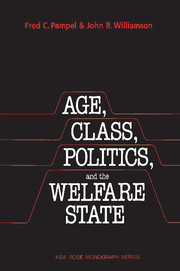Book contents
- Frontmatter
- Contents
- List of tables
- Preface
- 1 The welfare state: some neglected considerations
- 2 Theoretical perspectives on the welfare state
- 3 Social welfare spending in advanced industrial democracies
- 4 Social welfare spending and democratic political context
- 5 Economic growth, social welfare spending, and income inequality
- 6 Infant mortality, equality, and social welfare spending
- 7 Conclusions: The causes and consequences of the welfare state
- References
- Index
- Other books in the series
1 - The welfare state: some neglected considerations
Published online by Cambridge University Press: 30 April 2010
- Frontmatter
- Contents
- List of tables
- Preface
- 1 The welfare state: some neglected considerations
- 2 Theoretical perspectives on the welfare state
- 3 Social welfare spending in advanced industrial democracies
- 4 Social welfare spending and democratic political context
- 5 Economic growth, social welfare spending, and income inequality
- 6 Infant mortality, equality, and social welfare spending
- 7 Conclusions: The causes and consequences of the welfare state
- References
- Index
- Other books in the series
Summary
The social welfare state has come to play a crucial – perhaps dominant – role in the study of stratification. Social welfare spending is meant to reshape and limit market-based inequality and increasingly mediates how economic structures translate into social equality. The importance of the welfare state is shown not only by the huge amounts of income transferred by governments, or by the heated political debate over its effectiveness, but also by the large number of studies on the topic that exist in the social scientific literature. The fiscal problems experienced by many of the world's high-income democracies have renewed the interest of scholars in the welfare state, led to new theories of its causes and consequences, and placed researchers in the midst of political debates. All this effort and interest has not led to consensus; the politics and ideologies of the welfare state have become more contentious, and the social scientific literature has become increasingly disorganized and fragmented. Behind the bewildering array of arguments, findings, and conclusions, however, lies a set of three interrelated debates that together help to define the approaches taken to understanding the welfare state.
One debate concerns the relative influences of economic-demographic development and class structure as sources of the growth of welfare spending and as bases of group interests and mobilization. On one side, early theories of the welfare state focused on the standardizing effects of spreading industrial technology (Kerr et al., 1964).
- Type
- Chapter
- Information
- Age, Class, Politics, and the Welfare State , pp. 1 - 21Publisher: Cambridge University PressPrint publication year: 1989
- 1
- Cited by

